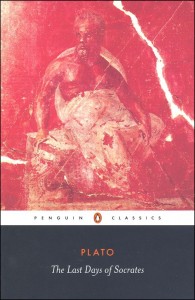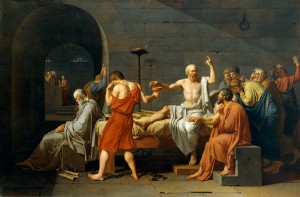 In the darker days of my youth, when every aspect of life was infused with undue urgency, I found consolation in a quotation from Socrates: “The unexamined life is not worth living.” It became a kind of personal mantra, something to recall in times of distress and sorrow, helping reassure me that doubt and skepticism were not only valuable but necessary, and that certainty was not something I should envy in others but reproach in myself. It was the project of the ancient Greek philosophers, and Socrates in particular, to challenge assumptions and expose the limits of human knowledge. Two millenia have not changed the questions or diminished their importance: do we have a purpose, and if so, what is it? What is a good life, and what does it entail? What are wisdom, courage, virtue and temperance? Underlying these questions is a belief in the dialectic: that through conversation and reasoned debate, answers may be found, conclusions drawn, and principles delineated. I submit to you that the whole of the literary tradition is merely a continuance of this conversation begun in Athens two thousand years ago, and that we possess no greater or more important heritage. I submit that the questions are universal, common to every human being no matter what their race, gender, nationality or sexual orientation. And I submit that these questions are also inescapable: failure to ask ourselves what we value does not free us from the question but imprisons us to our assumptions. Our answers are manifested in the careers we pursue, the friends we keep and the relationships we cultivate.
In the darker days of my youth, when every aspect of life was infused with undue urgency, I found consolation in a quotation from Socrates: “The unexamined life is not worth living.” It became a kind of personal mantra, something to recall in times of distress and sorrow, helping reassure me that doubt and skepticism were not only valuable but necessary, and that certainty was not something I should envy in others but reproach in myself. It was the project of the ancient Greek philosophers, and Socrates in particular, to challenge assumptions and expose the limits of human knowledge. Two millenia have not changed the questions or diminished their importance: do we have a purpose, and if so, what is it? What is a good life, and what does it entail? What are wisdom, courage, virtue and temperance? Underlying these questions is a belief in the dialectic: that through conversation and reasoned debate, answers may be found, conclusions drawn, and principles delineated. I submit to you that the whole of the literary tradition is merely a continuance of this conversation begun in Athens two thousand years ago, and that we possess no greater or more important heritage. I submit that the questions are universal, common to every human being no matter what their race, gender, nationality or sexual orientation. And I submit that these questions are also inescapable: failure to ask ourselves what we value does not free us from the question but imprisons us to our assumptions. Our answers are manifested in the careers we pursue, the friends we keep and the relationships we cultivate.
Socrates, I would later learn, comes down to us second-hand, having left no writings of his own behind. What we know of him comes from accounts by Xenophon, Aristophanes and, particularly, Plato, and thus a central question in scholarship revolves around distinguishing Socrates the man from Socrates the character. The book I read is artificial in the sense that Plato did not name it nor did he assemble its constituent chapters; it is, rather, a collection of Plato’s dialogues – the Euthyphro, Apology, Crito and Phaedo – united by theme and subject matter, all of them dealing with the trial of Socrates for blasphemy against the Gods and corrupting the minds of the Athenian youth by his teachings. In the Euthyphro, Socrates discusses the allegations with a friend; in the Apology, he presents his defense in front of a jury of his peers; in the Crito, he has been found guilty and sentenced to die, and he defends his decision to accept death rather than flee Athens; finally, in the Phaedo, he presents his argument for the immortality of the soul and why, as a philosopher, he should welcome death. I include the famous painting The Death of Socrates by Jacques-Louis David, depicting Socrates’ final moments as described by Plato: his friends and followers shattered to be losing such a friend, crying or unable to look him in the eyes, and Socrates himself, looking remarkably spry for his 70+ years, enthusiastic, undaunted, and pointing to the heavens (just as he is in Raphael’s The School of Athens), emblematic of Plato’s “Theory of Forms,” where he hopes his soul will be freed from the cares of the body.
To my mind, the best of Socrates’ legacies is his definition of knowledge. After the Oracle at Delphi names him the wisest man in Greece, Socrates, ever skeptical, seeks out the smartest Athenians – the poets, philosophers, craftsmen and politicians – to discover the truth of the Oracle’s claims and enquire into the nature of knowledge. Each new man he encountered gave him a detailed account of the extent of their vast knowledge, and each time Socrates left unimpressed, until he was forced to conclude that he was the wisest man in Athens, not because of what he knew, but because of what he did not know. Knowledge, according to Socrates, is understanding the extent of our ignorance. After two thousand years, we have no more apt, beautiful or simplistic definition than that.
The challenge of Plato and his Greek contemporaries, echoed in varying forms by our greatest thinkers, remains unchanged; each successive generation is tasked with deciding what constitutes a good life and what to do with the time allotted to us. In preparing to answer that question, we can do no better than study the answers of those who came before us.
